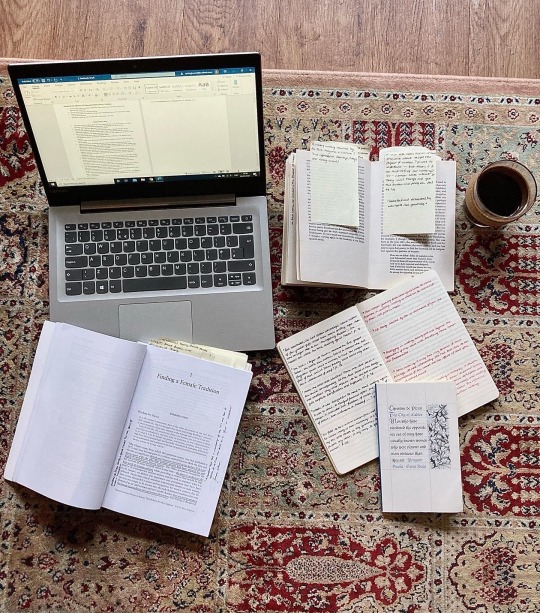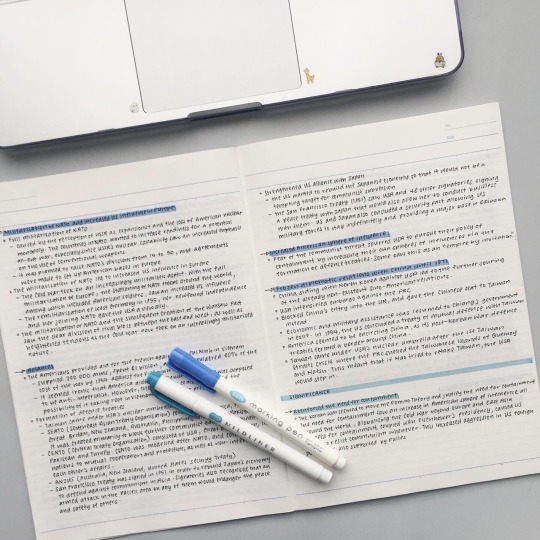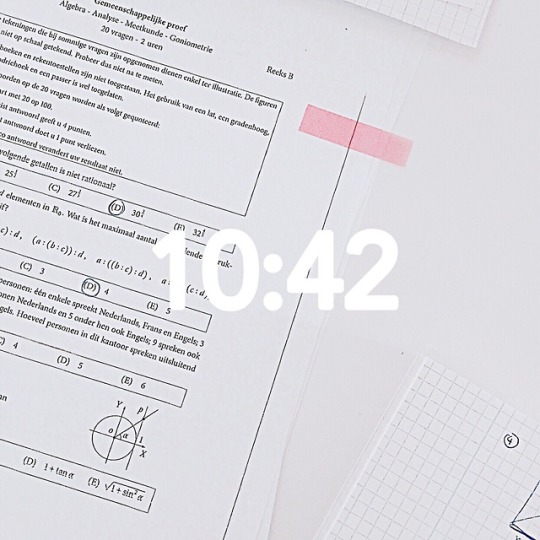Text
What Graders want to see – Tips for Papers, Essays (and Lengthy Exams)
Since I have some time on my hands right now, I’ve decided to make a no-nonsense post with basic tips for beginners from what I’ve learned from writing many, many exams averaging at around 12 handwritten pages and papers averaging at around 25 typed pages. Our grades are not given by the prof but by (overworked) graders. So, if you are in a similar grading situation or if your prof has to grade many people, these tips might be useful.
1. Go the extra mile: The Details
Imagine you are a grader. You read and grade the first essay/paper/whatever it is that you have to grade. Then you read the second one, the third, the fourth… And they all say the same freaking thing. Sure, some are less up to standard, some are more rambling… but essentially, they all contain very similar answers, arguments and concepts - even the wording is sometimes identical! That’s normal. It’s due to a combination of students discussing the assignments and their answers and, especially in the case of law, flocking to the same established sources and established arguments.
Be the one that sticks out as having done just a little bit more than the others. What do I mean by that? I don’t mean dig up abstruse arguments or write more. When talking about details, writing more than necessary and inflating topics that are not important at all (read: wholly unproblematic) will not win you points. Read that again. All it will do is annoy the grader whose time you are wasting. What I mean is: don’t only look at the most well-known textbook. Consider a wide variety and bigger number of sources and then show that you did by developing a slightly more carved out and slightly more distinguished wording and point of view. It won’t be a monumental difference – it can be a difference of just a more factually accurate half sentence – but the grader will know it when they see it. They notice.
2. Identify the core themes: The Meat
The above point is especially important for your Core Themes. Identify the points of issue (read: the problematic stuff) that your prof most likely wants to see you put emphasis on, the points which your whole writeup relies on to convince and win over – and go ham. Here is where you have to really show that you did more than average because here is where the grader will pay extra attention.
Again: wordier does not equal better. It’s more important to discuss and examine different views and possible arguments to show you engaged with the material on a deeper level. What the grader wants to see is this: how well you understood the given problem, how well you can think for yourself (and not just reiterate) and much time and effort you put into assorting what you wrote. This is important. This is what the grader will look at more critically while more or less skimming over the other 15 pages of your totally awesome and totally invaluable thoughts.
3. Leave a good impression: The Presentation
Graders are overworked. And frustrated. And they couldn’t care less about what kind of high-flown language you, a second semester student, come up with. Don’t use colloquial expressions but for the love of God, keep it simple. Clean and concise is almost always the way to go (this will also allow you to cram in a bigger number of the important things, see 2.). In the same vein, try to keep your paragraphs compact, write headlines when appropriate and stick to a uniform look. Your grader will thank you. You cannot imagine the messes people hand in. Yes, graders shouldn’t care about the aesthetics of your essay/paper. But the reality is that they do. Showing care in this aspect will reflect positively on you and your level of commitment. It will make the grader more inclined to go easy on you.
4. Other Tips:
Consider using more connectors like “consequently”, “therefore”, “as a result” and “since”.
Make the grader nod along with your argument. Remember, they are overworked. Use these to take the grader by their hand and lead them through the structure of your paper/essay/exam, show them how logical your argument is and how your points connect to each other for you to arrive at your specific conclusions. Just be careful that everything does, in fact, make sense, because if there’s a gap in your reasoning, this will make it much more obvious.
Collect a good number and a variety of sources.
Don’t cut corners here! In many cases, the references will be one of the first things the grader will see. If you have too little, bam, this is the first point they’ll criticize. Even if you technically have enough, if your references are more on the meagre side, the grader will take note of it subconsciously. That’s not the first impression you want. I’ve come to learn that juridical academics love it when you cite lots of essays of other established academics from academic magazines, but this will probably vary from major to major and place to place. However, it’s safe to say: don’t only look into textbooks and commentaries, actually use what is permitted.
I hope these were somewhat helpful to you. Feel free to add your own tips!
74 notes
·
View notes
Text


this super minimalist bujo style has been my favorite lately
321 notes
·
View notes
Photo

09.04.21 / sending you happy friday from my workspace. i hope you’ve had a lovely week ♡
2K notes
·
View notes
Photo


I am entirely consumed by my dissertation. After months and months of stagnation and brain fog, to work so hard at something and actually see progress is bliss.
ig: rhiharper
10K notes
·
View notes
Text
Law School Update
Well, my jazzy youngsters. First of all, I’m happy to say Hi to 200 followers! I started this blog in the beginning of my law studies and then literally stopped posting as soon as it actually began. The good news is that the reason for this is that I am really busy doing well in law school (I am ahead of the curriculum!!!). The bad news is that I am really busy. I do not think I will be active on here, but I will still use this blog occasionally/sporadically and am open to all asks, be it about law school or studying methods in general. Or maybe you want to ask me about whether I like pineapple on pizza - I am an open book. I hope everyone is doing well. Take care!
1 note
·
View note
Text
Literally do your work as soon as you know it exists. If you get homework, do it during your free or when you get home or on the train if you really want to, on the day you get it. Just got set an assignment? Get the draft done that weekend. It doesn’t have to be amazing and absolutely ready to send in, it just needs to exist. Just got sent an email? Reply when you see it. If you’re not sure how to response to it, write Dear (), leave a gap and then write Regards () and keep that in your drafts. Set a reminder on your computer or write the reminder on a sticky note that you’ve got that sitting in your drafts and you need to send it off in the next 24 hours. Need to clean your room? Don’t spend time thinking or planning how you’re going to clean it or how you’re going to change up the space in the process, just pick stuff up and put it where it should be until everything’s in order. Done. Seriously dude, when a task arises as an issue, tackle it as soon as you realise it exists. Remember, it doesn’t need to be amazing it just needs to be done. So, when the due date of the task creeps closer, you can go back, work with what you have and make it the quality you want it to be.
42K notes
·
View notes
Text


- korean war notes. again.
.
Today was lowkey productive, I guess? Did math practice questions, history paper 1 practice and a bit of lit revision
IG: @studybroe
1K notes
·
View notes
Photo


boy, was i a fool for thinking geometry was easy
4K notes
·
View notes
Text




08/14/2019
i recently did four spreads about the small road trip i took to montréal this summer! it was my first time really journaling like this and i quite like how it turned out :))) lmk what y'all think of it and how i can improve!
384 notes
·
View notes
Text
When to use flash cards: memorizing words/vocab, numbers, equations, names, dates, and verbatim facts or lines.
When to use mnemonic devices: memorizing steps of a process or sets of facts/information/people, especially in an order.
When to use concept maps or drawings: learning (rather than memorizing) relationships, processes, concepts, systems, etc.
When to use tables or charts: learning or memorizing systems (eg. conjugation in a foreign language), sets of sets of information (eg. people and when they lived and what they did), and other large/complex groups of information.
When to use songs: for learning or memorizing anything.
Disclaimer: this is a general guideline. If something else works for you, do it!
42K notes
·
View notes
Photo


ੈ♡˳ ┊ ꒰ 1 3 0 9 1 9 ꒱
❛studying sucks
less than failing.❜
today was the last day of my first semester in my first year of college. i emcee’d for the awards ceremony for my school, and i got home to banana fritters. i love banana fritters. i’m trying a different style of budgeting, and i’m so excited for the end results because it’s actually really easy for me.
2K notes
·
View notes
Text
‘am i Having A Brain Problem or Being a Shithead’: a short procrastination checklist
aka why tf am i procrastinating on The Thing (more like a flowchart, actually)
lots of people who have executive function difficulties worry about whether they’re procrastinating on a task out of laziness/simply wanting to be a jerk or mental struggles. this checklist might help you figure out which it is at any given time! (hint: it’s almost never laziness or being a jerk.) (obligatory disclaimer: this is just what works for me! something different might work better for you.)
1) do I honestly intend to start the task despite my lack of success?
yes: it’s a Brain Problem. next question
no: it’s shitty to say one thing & do another. better be honest with myself & anyone expecting me to do the task.
2) am I fed, watered, well-rested, medicated properly, etc?
yes: next question
no: guess what? this is the real next task
3) does the idea of starting the task make me feel scared or anxious?
yes: Anxiety Brain. identify what’s scaring me first.
no: next question
4) do I know how to start the task?
yes: next question
no: ADHD Brain. time to make an order of operations list.
5) do I have everything I need to start the task?
yes: next question
no: ADHD Brain lying to me about the steps again, dangit. first task is ‘gather the materials’.
6) why am i having a hard time switching from my current task to this new task?
i’m having fun doing what i’m doing: it’s okay to have fun doing a thing! if task is time-sensitive, go to next question.
i have to finish doing what i’m doing: might be ADHD brain. can I actually finish the current task or will I get trapped in a cycle? does this task really need to be finished?
the next task will be boring/boring-er than the current task: ADHD brain. re-think the next task. what would make it exciting? what am I looking forward to?
I might not have enough time to complete the task: ADHD brain wants to finish everything it starts. (if task is time-sensitive, go to next question)
i just want to make the person who asked me to do it angry: sounds like anxiety brain trying to punish itself, because I know I’ll be miserable if someone is angry at me. why do i think I deserve punishment?
no, I seriously want to piss them off: okay, i’m being a shithead
7) have I already procrastinated so badly that I now cannot finish the task in time?
yes: ADHD brain is probably caught in a guilt-perfection cycle. since I can’t have the task done on time, i don’t even want to start.
reality check: having part of a thing done is almost always better than none of a thing done. if I can get an extension, having part of it done will help me keep from stalling out until the extension deadline. i’ll feel better if I at least try to finish it.
no, there’s still a chance to finish on time: ADHD brain thinks that I have all the time in the world, but the truth is I don’t.
reality check: if i’m having fun doing what I’m doing, I can keep doing it, but I should probably set a timer & ask someone to check on me to make sure I start doing the task later today.
8) I’ve completed the checklist and still don’t know what’s wrong!
probably wasn’t honest enough with myself. take one more look.
if I’m still mystified, ask a friend to help me talk it out.
hope this helps some of you! YOU’RE DOING GREAT SWEETIE DON’T GIVE UP ON YOU
65K notes
·
View notes
Text

As students we get told a lot about study techniques and what to do to study, but this often involves the advice of studying in quiet areas instead of suggesting activities that might actually contribute to good grades. In this post i hopefully will answer this apparently difficult question and give you some ideas to integrate into your own study sessions.
Flashcards
Flashcards are scientifically proven to be a good way to retain information, this may be because as you write the cards out you go over key concepts then you get to test yourself on knowledge in the future as you use the cards. They can also be really fun to design and effective if used properly. They can be used as studying by making the cards one session and then maybe going over and testing yourself in another.
Practice Problems and Tests
Testing yourself is the most effective way to go over material, refresh concepts and also highlight which areas you may need to focus on when studying. You can usually find these in textbooks, off professors or by searching your course online. One night you may set out to do one chapter’s questions or questions on a particularly hard topic. It’s good to write down any issues you had and research them until you understand. Even more importantly is to do tests under exam conditions and time otherwise you will never truly know what you can do under that pressure.
Brainstorm Page
Like practice problems, this method has many of the same benefits. How it works is that you get a blank page and write all the information you can think of about a topic as if you were doing a summary. Afterwards you read it over alongside your notes and record anything you forgot to mention, these things would be key topics to go over.
Notes Summaries
For some people this technique might not be effective as it is recording information very similarly to how it was first consumed, though if you are a visual or kinetic learner it can be helpful. This way you go over your concepts and condense information so it easier to revise when exams come around. You can jazz this up by using your iPad or making notes bright and pretty so it is more engaging.
Mindmaps
Mindmaps are extremely useful in that they help establish connections between ideas within a concept which often furthers understanding. Similar to above they also help revise information taken in class or in textbooks and condense them in an engaging visual fashion.
Using the syllabus
the syllabus is usually set out in the form of questions or things you will need to know about a topic, these will also be the things you will be tested on so if you nail them you are essentially nailing any test. So in a study session i suggest writing out each syllabus point and answering it as if it was a question given to you in an exam to the best of your abilities and focus on getting a strong understanding of how to fulfil that question.You are normally given this before the start of a class if not you should ask your teacher/prof.
Videos
As a visual learning i find watching videos on topics extremely helpful and a way for information to be explained in a new way. So if you are struggling to grasp a concept try watching a video on it but remember to take notes because that way you stay engaged with the material. Documentaries can also really help in tying concepts together and build understanding.
Forums and Discussion
Have you heard people tell you that if you can explain a topic you know it, well this technique stems from that. Say one afternoon you have time to study, maybe get together with people from your class and try to explain things you’ve learn or discuss the whys and hows behind things you’ve learnt. This is a very social and very engaging ways to further understand course work. as always its good to take notes.
Overlearning
For many universities or classes the real difference between those who study and the top performing students is those who go above expectation. This isn’t saying that you should write a advanced paper on something completely unrelated to your content, however knowing evidence from different articles or the view points of different scholars is going to be the quickest way to show the time you’ve invested into the course. This can be done by reading articles, papers, watching documentaries, arguing in forums, searching Reddit, or anything that allows you to gain different perspectives and a more rich base of knowledge on a topic. Of course this is something you would do after compulsory units are nailed but maybe squeeze in time of a week to research the latest science articles or a different historians view or a new English text.
I hope this has been helpful it always helps me to brainstorm these things for you and remember what works. Also comment any of your favourite techniques because i’d love to hear them!
2K notes
·
View notes
Text
Going to Prague soon
I just hit 100 followers and wanted to say thank you! :) I haven't been here for long and already feel pretty well adjusted. Internet hugs for everyone (or not, if you don't like them)! Also, an update: My admission paper for law has arrived and I gave them some papers they needed in return, so everything is just about cut and dried.
Another thing: As mentioned in the title, I will be visiting Prague soon and I am SO excited to go. Anybody been there? I wondered if maybe you have some tips for places to visit?
Anyway, have a nice day!! :)
9 notes
·
View notes
Text
GET EXCITED ABOUT YOUR GOALS! THEY ARE THE THINGS YOU WANT! AND YOU CAN GET A LITTLE CLOSER TO ACHIEVING THEM EVERY DAY!
6K notes
·
View notes
Photo




27.6.2019 | [1/100 days of productivity]
Reposting some old pictures - (click on the pictures for hq)
2K notes
·
View notes
Text
Please read if you’re a student
You are NOT PROCRASTINATING, if
- you’re sick
- you have headache
- you feel pain
- you’re exhausted
- you feel anxious
- you have had big changes in your life that make you feel tired/restless/anxious/sad
- you have to skip a class/take rest because of reasons I mentioned above.
It’s not procrastinating. You’re not lazy. Everyone needs to have rest and take care of themselves when they’re sick. IT IS NOT OKAY TO WORK IN PAIN. Don’t burn out. It’s not worth it.
Do not feel guilty. After some rest and relaxing you will study even more effectively.
If you feel pain,
- take a medicine if it works for you
- put all of your books away
- take warm shower
- eat at least 1 healthy thing and 1 treat/feel-good-food, drink water
- go to bed, sleep or read a book/listen to music that is not related to your school (if you have headache/migraine I suggest you to switch off the lights and just sleep)
- just take your time - it’ll be all okay.
45K notes
·
View notes